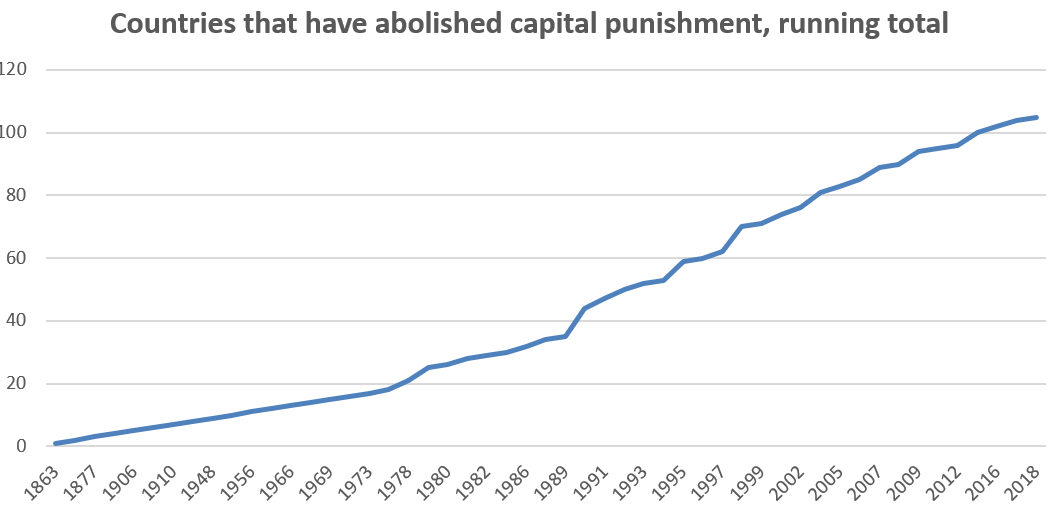According to press reports, Saudi Arabian prosecutors will be seeking the death penalty for five of the 11 suspects who stand accused of killing The Washington Post contributing journalist Jamal Khashoggi at the Saudi consulate in Istanbul in October of last year. Amnesty International notes that Saudi Arabia is one of the world’s most prolific executioners. Of the 993 reported executions that took place in 2017, the Gulf state was responsible for 146 of them – just under 15 per cent of the global total for the year.
The grisly murder and dismemberment of Khashoggi notwithstanding, the use of the death penalty has been falling since the second half of the 19th century and relatively few countries partake in the practice today. Let’s have a brief look at the history of the death penalty and the reasons for its declining use.
Since time immemorial, people have suffered capital punishment for a plethora of crimes – real and imagined. The Bible, for example, commands the death penalty for murder, kidnapping, attacking or cursing one’s parents, sacrificing one’s child to Moloch, willful negligence, sorcery, being a medium or spiritist, breaking the Sabbath, sacrificing to idol gods, blaspheming against God, false prophecy, giving false testimony in a capital case, adultery, incest, rape of a betrothed or married woman, homosexuality, bestiality, prostitution, pretending to be a virgin, and so on and so on.
As late as the 18th century, the British legal system included no fewer than 222 capital crimes. The Black Act of 1723 alone created 50 capital offences for such crimes as shoplifting and stealing of sheep, cattle and horses. According to Professor John H. Langbein from Yale University, before the death penalty for theft was abolished in 1832, “English law was notorious for prescribing the death penalty for a vast range of offenses as slight as the theft of goods valued at twelve pence.” (the equivalent of about $4 today).
Types of executions included beheading, burning, crushing, boiling to death, impalement, hanging, being broken on the wheel, sawing and crucifixion. Drawing and quartering was usually reserved for regicides such as François Ravaillac, who assassinated the French King Henry IV in 1610. As the British historian Alistair Horne noted, before being disemboweled and torn apart by four horses, Ravaillac “was scalded with burning Sulphur, molten lead and boiling oil and resin, his flesh then being torn by pincers.”
It’s no coincidence that the guillotine was introduced during the French Revolution to make death relatively quick and painless. The thinkers whose writings inspired the revolt favoured a more proportionate, rational and humane justice system. Voltaire, for instance, opposed punishment for violations of religious dogma. Montesquieu wanted punishment to fit the crime and opposed the use of torture. Cesare Beccaria and Jeremy Bentham opposed capital punishment outright, reasoning that life behind bars was a greater deterrent to heinous crimes than summary execution.
As the ideas of the Enlightenment spread, punishment became less gruesome and the number of capital offences dwindled. In the United Kingdom alone, the number of capital offences fell from 222 to four in the first half of the 19th century. Society did not suddenly become more chaotic as a result. On the contrary, as Harvard University psychologist Steven Pinker showed in his 2012 book The Better Angels of Our Nature, violence decreased. As such, reform-minded governments felt emboldened to go further and abolish the death penalty altogether.

Venezuela led the way with the abolition of capital punishment in 1863. Other states followed, though it took another century, before the abolitionist movement really took off in the 1960s. In 2017, Amnesty International noted that “106 countries (a majority of the world’s states) had abolished the death penalty in law for all crimes and 142 countries (more than two-thirds) had abolished the death penalty in law or practice.”
That year, only 23 countries are known to have carried out the death penalty. Of the reported 993 executions, 84 per cent took place in just four countries – Iran, Saudi Arabia, Iraq and Pakistan. However, the above number does not include China, which is likely to have executed more people than all the other countries put together. According to Amnesty International, “the true extent of the use of the death penalty in China is unknown as this data is classified as a state secret; the global figure … excludes the thousands of executions believed to have been carried out in China.”
Looking on the bright side, the death penalty is now a relative rarity, concentrated for the most part in a handful of authoritarian countries. On the other hand, a decline in total state executions is unlikely to happen until we see fundamental political reform in some of the world’s most illiberal countries.
This first appeared in CapX.

